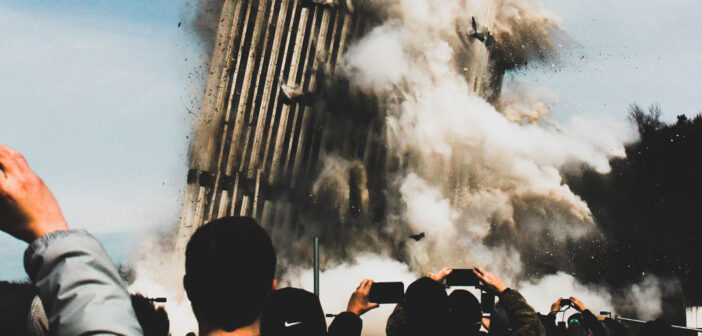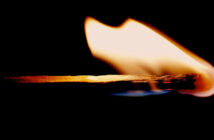Sundays were typically a bleak affair.
This weekday was so dreaded that I commonly referred to it as “Somber Sunday.” Why? Because the psyche of the Gay Narcissist seemed to collapse every single Sunday, usually late in the afternoon. And as the day progressed into evening, his darkness would only intensify.
The Gay Narcissist withdraw into himself, grow fussy and petulant, and start picking at me. He looked for anything I might be doing wrong in the present, I had done wrong in the past, or I could do wrong in the future, and he’d seize upon it.
Or, if that wasn’t amusing enough for him, he’d sit on his phone shopping. Maybe he’d cruise the apps looking for sexual attention. He’d almost always want to sooth himself with junk food. It was always the same routine—Somber Sundays were an immense trial for him, and he’d do anything to ease his extreme discomfort.
I didn’t know it at the time, but I was witnessing a narcissistic injury followed by a narcissistic collapse every single Sunday.
Is It A Narcissistic Injury?
As with all of this terminology, I’ve seen the term “narcissistic injury” used different by different people.
But in this instance, I never knew what else to call the perpetual experiences of Somber Sunday except for “narcissistic injury.” The psyche of the Gay Narcissist appeared to collapse in upon itself every single Sunday afternoon like a black hole of misery, and if I was not careful I’d fall over the event horizon and get sucked in, too.
Guess what?
I was rarely careful, and was almost always pulled into the solemn and bleak energy. How could I not be? I shackled myself willingly to the Gay Narcissist and all of his wants, needs, and emotions during my conscious hours.
Such energy did these days have that it was like a black shadow creeping over the very room we were in together. What a whirlpool of despair these Sunday afternoons were.
In Dr. Joseph Burgo’s book, The Narcissist You Know: Defending Yourself Against Extreme Narcissists in an All-About-Me Age, he describes at length the concept of a “narcissistic injury.” Since the confidence displayed by narcissists is a fragile facade hiding deep and pathological insecurity, it’s rather easy to puncture a narcissist’s confidence if you know where to fire your shots. And, continuing with the metaphor, we have a narcissistic injury.
In Joseph Burgo’s own words from Chapter 02: “I’m Easily Wounded” – Self Esteem And Narcissistic Injury” from The Narcissist You Know:
Because human beings are social animals, we develop our sense of self and self-worth within a social context, in relation to others.
I may build self-respect by living up to my own standards and ideals, but I also need the important people in my life (my significant others, my colleagues and employers, my teachers) to respect me. If they do, that experience contributes to and supports my sense of self-worth. When they criticize me, even if I have a fairly robust sense of self, it may very well hurt.
As a social animal, I naturally crave the approbation of the other members of my “pack,” and to receive their disapproval instead would wound me, shaking my sense of self-worth . . . at least for a time. In the language of my profession, these blows to one’s self-esteem are referred to as narcissistic injuries.
While psychoanalysts and psychologists usually discuss narcissistic injury in the context of mental disorders, it’s actually a universal aspect of everyday life: On a regular basis (and more often than you might imagine), each of us must deal with challenges to our self-esteem in the form of disapproval, slights, and rejection.
Am I describing a narcissistic injury, or something else?
Using the term “narcissistic injury” correctly to describe these Somber Sundays?
Honestly, who knows?
“Collapse” Is Also An Apt Word
On more than one occasion when describing Somber Sundays to friends, I’d sometimes describe the Gay Narcissist as “collapsing in on himself like a dying star.”
Funny enough, there’s a term for this, too—“narcissistic collapse.”
Similar to a narcissistic injury, a narcissistic collapse is when the machinery of a narcissist’s false exterior stops working entirely, and he or she can no longer function in the world. The external validation a narcissist requires to survive emotionally (the narcissistic supply) is either no longer delivered on time or serving its purpose.
Elinor Greenberg, Ph.D., wrote on this topic for Psychology Today in her blog post, “What Is Narcissistic Collapse?”
As Greenberg describes:
As a result of their dependence on external validation and their value on their public image, narcissists can experience a debilitating narcissistic collapse when they anticipate a humiliating public failure.
The anxiety associated with the idea of being exposed as flawed can interfere with their mustering enough defensive grandiosity to support their self-esteem.
Without the prop of their grandiosity, they can sink into a shame-based depression in which they are afraid of the future and can no longer function in the present.
So which is it?
Were Somber Sundays a result of a narcissistic injury, a narcissistic collapse, both, or something else entirely?
Like Clockwork
It doesn’t really matter.
I can say this for certain: the blustery, pompous, and obnoxious Gay Narcissist transformed into a wounded and weak kitten almost every Sunday afternoon around 2:00 PM or so—without fail.
But, what was causing the injury to occur?
Well, I think it was an aversion to starting a new work week, as ridiculously simple as it sounds. Despite the Gay Narcissist having a solid and secure job from which he earned quite a nice living, he slipped into these dark depressive states.
Was he anxious about underperforming or being “found out” in some way? Maybe.
Was he resentful that he had to earn a living, even though he felt he was entitled to freedom from work? I think so.
Was he weary of having to start a new week, all over again, presenting his facade of phony confidence and bullshit gregariousness? Sounds about right.
Shouldn’t he be pitied, then?
Here’s the thing.
In these moments, the Gay Narcissist could turn incredibly cruel. He showed zero hesitation in targeting me. He would start to sort through his back catalogue of all my past misdeeds, and he never hesitated in reopening wounds still tender. He’d accuse, ridicule, and attack. And I’d often sit by his side, absorbing all of it. I wouldn’t defend myself. I would rarely even refute anything he said.
And then Monday morning would come, he’d rise up and go forth into the day, like the Somber Sunday before never even happened.
Talk about maddening.
* * *
Confused by some of the terminology I use to describe people and places?
Check out the Gay Narcissistic Relationship Glossary for more information.
* * *
If you’re interested in learning more about narcissism, toxic relationships, dark personalities, and sexuality, then I highly recommend the books below.
Please consider buying through the provided Amazon Associate links. While the content on my website is yours to read for free, I do appreciate any support offered toward my work.
The reading list includes:
Should I Stay Or Should I Go: Surviving A Relationship With A Narcissist (Dr. Ramani Durvasula)
The Human Magnet Syndrome: The Codependent Narcissist Trap (Dr. Ross Rosenberg)
The Sociopath Next Door (Dr. Martha Stout)
Without Conscience: The Disturbing World Of The Psychopaths Among Us (Dr. Robert D. Hare)
In Sheep’s Clothing: Understanding And Dealing With Manipulative People (Dr. George Simon)
Rethinking Narcissism: The Bad—And Surprising Good—About Feeling Special (Dr. Craig Malkin)
Being Homosexual: Gay Men And Their Development ( Dr. Richard Isay)
The Velvet Rage: Overcoming The Pain Of Growing Up Gay In A Straight Man’s World (Dr. Alan Downs)




